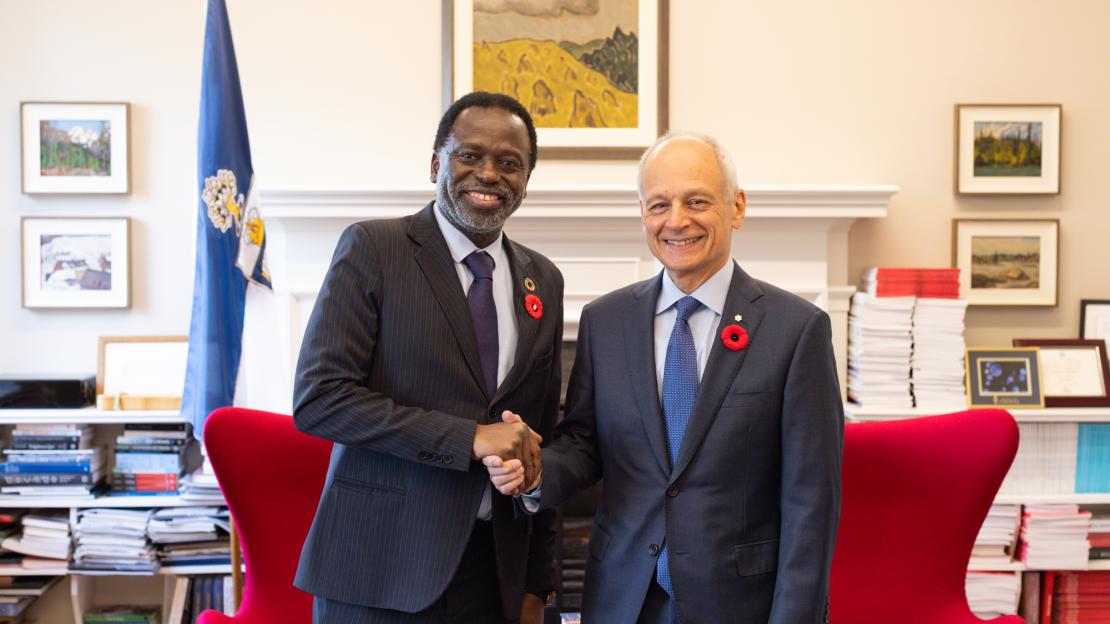There is no shortage of pressing environmental challenges.
From food insecurity to water scarcity, pollution to loss of economic livelihood, the solutions to these complex challenges will require strategic management, partnerships and interventions from government and non-governmental organizations alike.
The role data and science-informed policy can play in addressing these challenges was the focus of a recent two-day visit by delegates from United Nations University (UNU) at the University of Toronto.
“The best science is taking place at universities, but they sometimes are not in the best position to influence public policy,” says Professor Kaveh Madani, director of UNU’s Institute for Water, Environment and Health (UNU-INWEH) who was part of the UNU delegation invited to U of T.
“UNU plays a critical bridging role in data-driven policymaking, so we want to bring the UN to the university campus as much as possible.”
Launched in Tokyo in 1975, UNU is the academic arm of the United Nations. It’s mission is to help address global challenges relating to human survival, development and welfare through research and education. UNU’s three key areas of focus include peace and security; social change and economic development; and the environment, climate and energy. UNU-INWEH, known as the UN Think Tank on Water, is one of the 13 research and training institutes of UNU across the world and is hosted by the Government of Canada.
A highlight of the visit was a lecture by UNU Rector and UN Under-Secretary General Tshilidzi Marwala focused on artificial intelligence (AI) and public policy. Marwala, a South African AI expert and computer scientist, highlighted critical AI development issues such as the importance of including the voices of the global south in AI and the value of education in bridging the gap between science and public policy.
“There’s an expression where I’m from that goes; ‘there’s nothing about us without us.’ We should have policy, frameworks or governance models that optimize this perspective.” He points to the fact that the global south is conspicuously absent from the securitization of AI, and that global policy standards in regulating and harnessing AI remains fragmented at best.
Marwala went on to say that climate data should be allowed to flow more freely across borders to build accurate models that can help tackle climate change, adding that education can play an important role in bridging this particular science-policy gap.
“We need to make education more multidisciplinary,” he says. “There are information asymmetries between lawmakers and tech developers, and we need to fix that through greater scientific literacy and dialogue.”
In addition to lectures and meetings with various university leaders including U of T President Meric Gertler, the delegates visited various spaces across the St. George and Scarborough campuses. Both groups also explored and discussed potential partnership opportunities between UNU and U of T aimed at bridging the science-policy gap.
Professor Irena Creed, Vice-Principal of Research and Innovation at U of T Scarborough, says universities are uniquely positioned to respond to global environmental challenges, especially though partnerships with organizations like the United Nations.
“It was a privilege to meet with the members of the UNU delegation to explore potential partnerships between U of T and UNU,” says Creed.
“We are also excited by the potential to raise the profile of the convergence research being done through the new institutes for Resilient and Inclusive Societies and Ecosystems (iRISE) and SDGs@UofT. These groups will be dedicated to addressing climate change, water and food security, and the transition to clean energy supplies, so we’re excited to explore these potential partnerships.”
